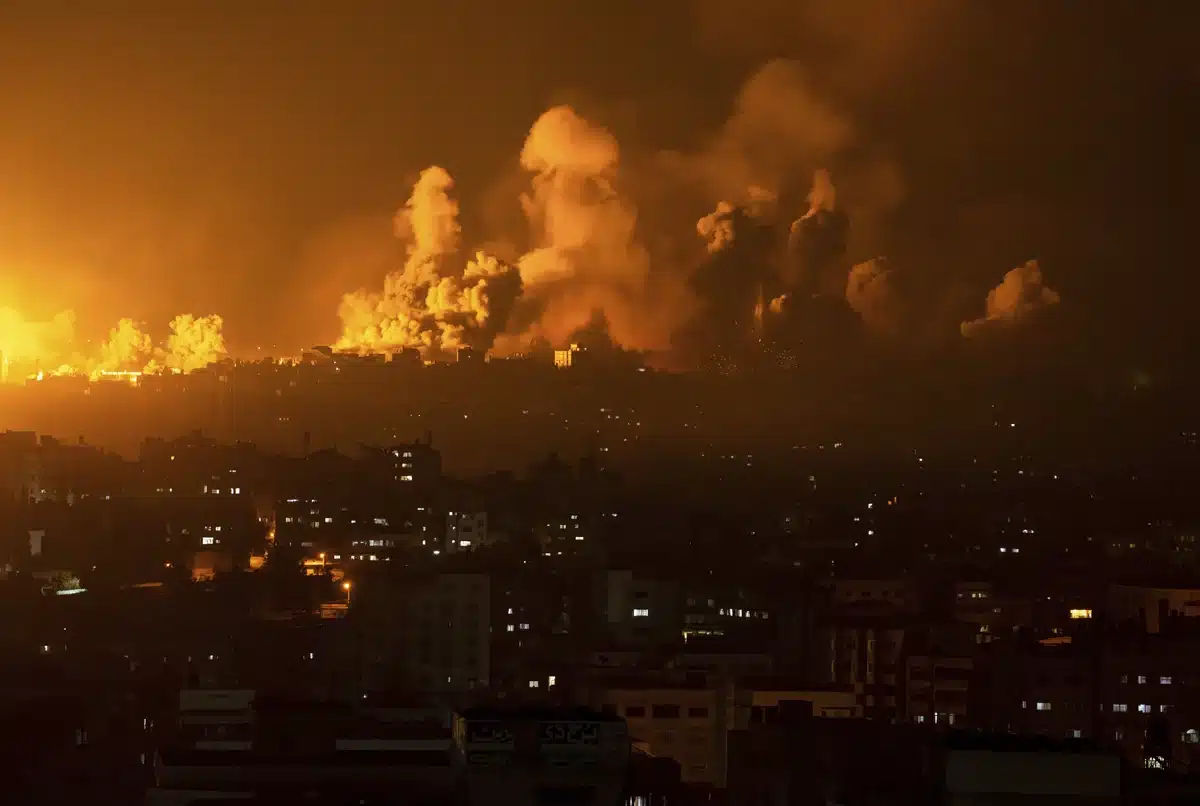Can War Ever Be “Just”? – Part 3 – Greg Albrecht

In Part One we provided an overview of Christ-centered teaching about violence and war [click here to read part 1], in Part Two we summarized two views – 1) Just War and 2) War is Always Wrong – It Is Never Just [click here to read part 2], and now we continue with:
Part Three: Can War Ever Be “Just”?
Two Wars in 2024
Part of your question specifically concerns the Israeli-Hamas war. You asked about the pro-Palestinian protestors and their demands that war be fair and equal.
If we believe war is never “just” then both parties in this war, like all other wars, are wrong. No further discussion needed. By the teachings of the kingdom of God, articulated clearly by the King of the kingdom, they are both wrong. Violence does not justify violence. Two wrongs do not make a right. Calling out the evil and atrocities of “one side” does not equate to, by the teachings of Jesus, a complete endorsement of the violent response of the other “side.”
However, many Christians object to such a belief on the grounds that it is an impossible practice in a world where violence and war are facts of life. Christians who advocate just war charge those who believe in non-violent pacifism as living in an ivory tower, and ask them if such views became the predominant view then, in the words of an old country song, “then how long can the rest of us count on being free?”
Therefore, while non-violent pacifism is the obvious teaching of the Jesus Way, most Christians today, and the vast majority of Christian denominations today, see a “middle ground” of supporting the teachings of just war.
While just war is not my belief as a Christ follower, given that warfare is a fact of life, an inevitable consequence of human history, I understand that just war offers Christians a logical “compromise” with the teachings of Jesus and the fact of living in a world where violence and warfare besieges us. Perhaps this discussion is not a matter of either/or, or right/wrong, but perhaps both views might have merit.
Returning to the War in Gaza, let us examine the logic and principles of just war, which for me is a watered-down-ethic which devalues the gospel, as a way in which the western world at large and Christianity specifically attempts to respond to the un-Christ-like, seemingly inescapable certainty of warfare.
Under the moral principles of just war as that perspective applies to the War in Gaza, leaving aside whether or not just war is justifiable for a Christ follower, let us consider the hypothesis of just war, not, on the one hand, in an adversarial hateful or racist fashion, nor, on the other hand, from a triumphal, nationalistic way.
Again, for emphasis, the outbreak of these fresh hostilities in the Middle East, is not a reason for Christ followers to take sides. We see this war in Gaza bringing a resurgence of some Christians, whose particular beliefs include necessary warfare in or near Israel as a “sign” of the Second Coming, pushing an unconditional pro-Israel stance even as the warfare continues with innocents enduring cruel and unspeakable suffering.
Christians take no pleasure in war. We derive no satisfaction from seeing either Jews or Muslims suffer. We take no sides when it comes to death dealing and bloodletting. We do not support, and in fact decry the shocking and startling rise in antisemitism fueling pro-Palestinian spawned protests, most particularly in the United States.
As Christ-followers we join those who mourn the predicament of the Palestinian people in Gaza. As Christians, part of our spiritual identify in Christ is moved by compassion when we see and hear of torment and affliction.
But part of living in Christ includes maturing in Christ, so that we are not “blown here and there by every wind to teaching by the cunning and craftiness of men in their deceitful scheming” (Ephesians 4:14) and thus not falling, hook, line and sinker for theological, philosophical or political propaganda which seeks to justify hatred and animosity.
When Christ followers see, as we do right now, people(s) enveloped in tragedy and misery we must also ask about the real causes and perpetrators who are oppressing, abusing and using those who are enduring unspeakable and horrific anguish. Christ-centered compassion includes an honest analysis of how suffering for which we are compassionate might be both alleviated and solved.
We must ask about the justice or lack thereof involved in the real causes of the hideous and appalling suffering being endured by the Palestinians.
We must ask about Hamas and the nature of this tyrannical, despotic and evil terrorist movement.
We must ask why Hamas treats its “own people” as human shields. We must ask if Palestinians in Gaza are in fact pawns, indoctrinated hostages of Hamas. We must ask why Hamas would keep the remains of non-combatant Israeli citizens it butchered on October 7 in a tunnel in Gaza, never returning their remains, perhaps using dead bodies Israel thought were alive as bargaining chips in their negotiations.
We must ask why the protestors who say they are demonstrating against violence inflicted on Palestinian victims respond with racist and hateful rhetoric and threats, insisting Jews everywhere and the Israelis in particular deserve retribution culminating in annihilation and wholesale slaughter or a race and a religion? Some of the pro–Palestinian protests have advocated genocide by the oft repeated war cry “from the river [Jordan] to the sea [Mediterranean]” – a cry that calls for the destruction of all Jews racially and Judaism religiously from the territory now called Israel.
We must ask blatantly pro-Palestinian protestors about hatred and unapologetic, unmitigated and flagrant anti-Semitism, while many demonstrations here in the United States hypocritically cloak themselves in the ostensible illusion of caring and supporting all racial, religious and gender minorities?
We must ask if the unabashed pro-Palestinian protests propose Hamas being excused for their brutalities while holding the feet of the Israeli defense to the fire of self-righteous condemnation. We must ask if such protests and demonstrations believe that there are others, in addition to Israelis and Jews, who, in their estimation, deserve calls for totalitarian genocide?
We must ask the protestors who say they believe in freedoms enjoyed under the democracy (like that of Israel), who say they support gender, religious and political equality why they are siding with Hamas, whose depraved reaction as a totalitarian terrorist regime to such freedoms enjoyed under democracy is well known. We must ask pro-Palestinian protestors why it seems they call for fair play and equality for everyone except the nation of Israel and Jews at large.
Fair and equal? We must ask protestors who say that the deaths caused by Israel since October 7, 2023, are far out of proportion to the deaths caused by Hamas – one must ask whether war is ever deemed to be a fair fight, an equal endeavor and one that is always exactly an eye for an eye. When it comes to “just war” we recall the words of Augustine: “love does not preclude a benevolent severity,”
Why are the fair and equal pro-Palestinian protestors not protesting oil rich nations in the vicinity of Gaza who have thus far failed to provide Palestinians with a safe sanctuary, when they have abundant resources to do so? We must ask protestors who rain down hate, bigotry and condemnation on Israel why the Arab countries at large in that region have steadfastly refused to welcome Palestinians.
We must also ask why Israel cannot find a less grievous and violent way to seek the end of the hostilities, the release of hostages (living or dead) and some kind of cease fire. We cannot, as Christ followers, wholeheartedly side with violence, whether it is deemed justifiable by the accepted conventions of just war or not.
We must ask pro-Palestinian and hatefully anti-Semitic protests and demonstrations why they are only demonstrating against the horrors of war being visited on Palestinians in Gaza. Why have protestors failed to protest suffering in the Ukraine at the hands of the Russian military? If one protests one injustice, and one truly believes in equal rights, and one is opposed to aggression of an oppressor, then why not protest the brutal and cruel onslaught of the Russians against the Ukrainians, an unprovoked war against a militarily outmatched nation? But there is a strange and troubling silence about the barbarisms visited on the Ukraine by Russia with no such protests.
The war in the Ukraine is ironically one which pits the followers of the same generic iteration of Christian faith – Eastern Orthodox – against one another in a deadly struggle. The question has rarely been raised and never answered: Where is the Christianity – where is any moral cause in such a war? There is no case for the Russian brutalities as being considered “just.”
According to the non-violent pacifism of the gospel, neither “side” in the wars in the Ukraine and Gaza is justified. On the other hand, according to the principles of just war, there is no “moral equivalence” between the vicious Hamas inhumanity and barbaric evil and the defensive war to root out such evil being waged by Israel. There is no “moral equivalence” between the aggressions and ruthless savagery of Russian and the defensive military responses of Ukraine.
For Christ followers, “moral equivalence” can only be found in the cross of Christ, testifying to the fact that Jesus was killed, he laid down his own life, but he crucified no one. The cross of Christ is the ironic, ultimate “moral equivalence” which brings the eternal peace of God.
Jesus cared for people who were oppressed and impoverished, but he did not make their predicament a political cause. We need, as Christ followers, to beware of jumping into bed with political, national and religious causes which at best blur the gospel, if not replace it. We are well served to realize that God is not glorified in earthly alliances and allegiances that demonize any “side” or religion or national interest. We are well served to always remember there is truly only one Kingdom, and that Kingdom is “not from here.” Our spiritual destination, our eternal values and commitment, our hopes and our dreams, our allegiance is to the Kingdom of God. All else is but dross. With Paul we count everything other than Jesus, the King of the Kingdom, as loss (Philippians 3:7-8).
WATCH FOR PART FOUR OF THIS SERIES – CAN WAR EVER BE “JUST”?
We hope that our articles and resources bring comfort, hope, encouragement, and healing to our readers. If you’re experiencing that, please subscribe freely, share freely, and, if you’re able, please consider donating freely toward paying it forward by clicking the blue giving at the top of your screen.


 Plain Truth Ministries | Box 300 | Pasadena, CA 91129-0300
Plain Truth Ministries | Box 300 | Pasadena, CA 91129-0300
